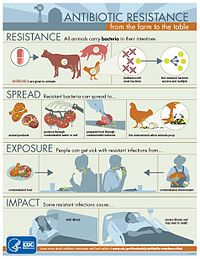
Photo from wikipedia
Streptomyces are recognized as antipathogenic agents and plant-growth-promoting rhizobacteria. The objective of this study was to evaluate the capacities of four antifungal Streptomyces strains to: produce the substances that are… Click to show full abstract
Streptomyces are recognized as antipathogenic agents and plant-growth-promoting rhizobacteria. The objective of this study was to evaluate the capacities of four antifungal Streptomyces strains to: produce the substances that are involved in plant growth; solubilize phosphates; and fix nitrogen. The effects of the volatile organic compounds (VOCs) that are emitted by these strains on the growth promotion of Arabidopsis thaliana and Phaseolus vulgaris L. (var. Pinto Saltillo) seedlings were also tested. All of the Streptomyces strains produced indole-3-acetic acid (IAA) (10.0 mg/L to 77.5 mg/L) and solubilized phosphates, but they did not fix nitrogen. In vitro assays showed that the VOCs from Streptomyces increased the shoot fresh weights (89–399%) and the root fresh weights (94–300%) in A. thaliana seedlings; however, these effects were less evident in P. vulgaris. In situ experiments showed that all the Streptomyces strains increased the shoot fresh weight (11.64–43.92%), the shoot length (11.39–29.01%), the root fresh weight (80.11–140.90%), the root length (40.06–59.01%), the hypocotyl diameter (up to 6.35%), and the chlorophyll content (up to 10.0%) in P. vulgaris seedlings. 3-Methyl-2-butanol had the highest effect among the ten pure VOCs on the growth promotion of A. thaliana seedlings. The tested Streptomyces strains favored biomass accumulation in A. thaliana and P. vulgaris seedlings.
Journal Title: Plants
Year Published: 2022
Link to full text (if available)
Share on Social Media: Sign Up to like & get
recommendations!